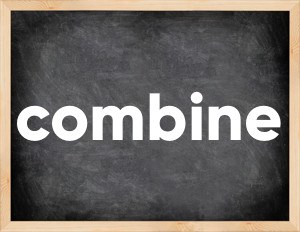 The English verb 'combine' is pronounced as [kəmˈbaɪn].
The English verb 'combine' is pronounced as [kəmˈbaɪn].
Related to:
regular verbs.
3 forms of verb combine: Infinitive (combine), Past Simple - (combined), Past Participle - (combined).
Here are the past tense forms of the verb combine
👉 Forms of verb combine in future and past simple and past participle.
❓ What is the past tense of combine.
Combine: Past, Present, and Participle Forms
| Base Form | Past Simple | Past Participle |
|---|---|---|
| combine [kəmˈbaɪn] |
combined [kəmˈbaɪnd] |
combined [kəmˈbaɪnd] |
What are the 2nd and 3rd forms of the verb combine?
🎓 What are the past simple, future simple, present perfect, past perfect, and future perfect forms of the base form (infinitive) 'combine'?
Learn the three forms of the English verb 'combine'
- the first form (V1) is 'combine' used in present simple and future simple tenses.
- the second form (V2) is 'combined' used in past simple tense.
- the third form (V3) is 'combined' used in present perfect and past perfect tenses.
What are the past tense and past participle of combine?
The past tense and past participle of combine are: combine in past simple is combined, and past participle is combined.
What is the past tense of combine?
The past tense of the verb "combine" is "combined", and the past participle is "combined".
Verb Tenses
Past simple — combine in past simple combined
(V2).
Future simple — combine in future simple is combine (will + V1).
Present Perfect — combine in present perfect tense is
combined
(have/has + V3).
Past Perfect — combine in past perfect tense is
combined
(had + V3).
combine regular or irregular verb?
👉 Is 'combine' a regular or irregular verb? The verb 'combine' is regular verb.
Examples of Verb combine in Sentences
- They should combine our membership fees. (Present Simple)
- She combined several personalities at the same time. (Past Simple)
- The committee has combined all the observations, interviews and information from reliable sources (Present Perfect)
- Let's combine our two companies against our competitors. (Present Simple)
- Combine all the ingredients in a large bowl to make a dough. (Present Simple)
- Is this true that diets are most effective when combined with exercise? (Present Simple)
- Many people enjoy combining a hobby with learning a new skill. (Present Simple)
- Steel can be produced by combining iron with carbon. (Present Simple)
- She must combine both of this strengths if she wants to survive. (Present Simple)
- Can we allow women to achieve higher education and combine child-rearing with employment? (Present Simple)